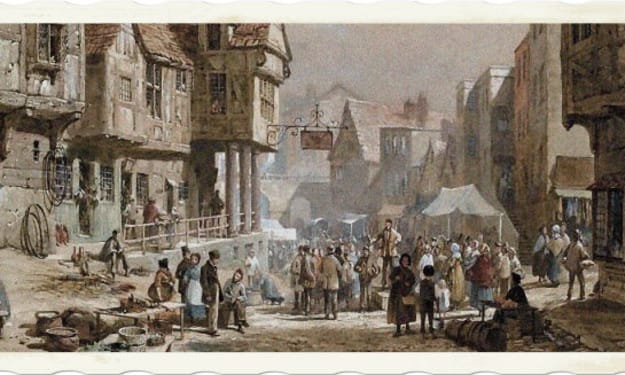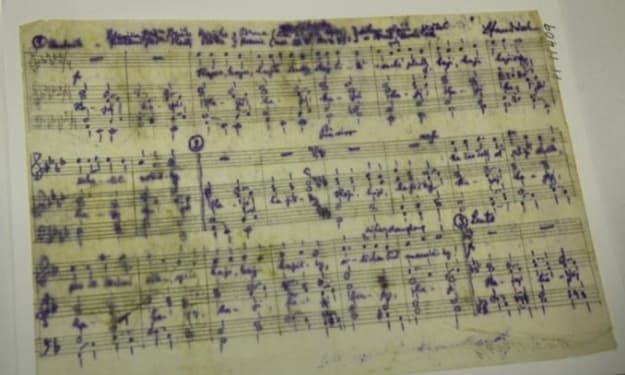The Devil Inside
Satan in Paradise Lost

Although the age of faith was transitioning into the age of reason when John Milton dictated Paradise Lost, life in the 17th century still very much revolved around the Church. Therefore, it was important for the English upper classes to maintain the appearance of religious piety. As a result, the impious masqueraded as meek and God-fearing Christians. It is because of this religious hypocrisy that John Milton painted a non-traditional portrait of Satan in his epic poem about the Fall of Adam and Eve. The uniqueness of Satan in Paradise Lost has fascinated theologians, scholars, and the laity for centuries, and for some very good reasons. The character is fascinating because he reminds readers that the same evil in his heart is also in their hearts.
The Devil in Disguise
As Paradise Lost opens, the reader is shown a glorious representation of Satan, but throughout the poem, Satan changes dramatically. He transitions from a fallen warrior, a former prince of Heaven, to an ignoble trickster who targets Eve to destroy her innocence and happiness. By creating such a wide character arc for Satan, Milton compels the reader to understand Satan on more than just a superficial level. By doing this, Milton hoped to create a certain response in the reader. How Milton did this is what makes Satan such a fascinating character study.
Both Percy Bysshe Shelley and William Blake believed that Satan, with his “incredible fortitude and magnificent rhetoric, is the true hero of Paradise Lost.” This belief is shared by many other scholars and writers. There is much debate about what role, hero or villain, Satan plays in Paradise Lost because the character of Satan is uniquely executed. Though Satan is traditionally portrayed as the vile corrupter, in Milton’s epic he is modeled on a base heroic archetype known as the Homeric model. This label is the result of Satan sharing characteristics with the tragic Achilles. However, there are distinct deviations from the Homeric model. Milton's Satan is clever, duplicitous, and capable of self-doubt. Achilles is not. Therefore, Satan's archetype is closer to the Homeric deviation known as the Byronic model, which has all the elements of the Homeric model, but the Byronic model allows for characters of greater depth. Byronic heroes are usually far more cunning and troubled than Homeric heroes. They are prone to dissent and treachery, though they are still seen as the protagonists of the stories they inhabit. Satan is drawn on the Byronic model in Paradise Lost as a means of tinkering with the expectations of the reader.
Sympathy for the Devil
In the words of John Ottenhoff, an English professor at Alma College, “Paradise Lost demands a level of reflection that few other texts can duplicate.” This occurs because Milton can manipulate his readers by altering their perceptions, thereby allowing them to engage in self-analysis. But for this self-analysis to begin, the reader must reach some common ground with Satan. The best means of achieving this goal, it seems, is to make the readers sympathize with Satan; sympathy must first begin with empathy. If, when Satan’s crimes are revealed, the reader continues to empathize with Satan, then it is likely they have committed some of those same moral crimes or, at the very least, they recognize the emotions fueling those crimes. But those connections require a high level of introspection from the reader, and to achieve this end, Milton had to make the devil intriguing enough for readers to care. Because many readers will find Satan’s crimes deplorable, the initial empathy must also be tempered with other elements to keep the reader sympathetic, so Milton uses some clever techniques to draw people to the devil’s point of view.
Milton creates a connection to Satan in several ways. Firstly, the image he paints of Satan in Book I is a glorious portrait. Though Satan is still reeling from his fall, when he rises from the lake of fire, he is an admirable sight, a warrior true:
“… the superior Fiend
Was moving toward the shore; his ponderous shield
Ethereal temper, massy, large, and round
Behind him cast; the broad circumference
Hung on his shoulders like the moon, whose orb
Through optic glass, the Tuscan artist views.”
Secondly, Milton makes Satan a brilliant and charismatic leader. Satan, not unlike Achilles, uses his charisma to rally his troops with promised glory. In addition to being charismatic, however, he is also cunning. These are two characteristics that, when combined, are hallmarks of the Byronic hero. When Satan enters into council with his minions, his diplomacy and magnanimity seem genuine, but he is merely using his cunning and charisma to manipulate the fallen. He does so using solid rhetoric. For example, the first words to his minions are as follows: “Princes, Potentates, Warriors... the flower of Heaven, once yours, now lost”
This greeting is similar to the one Marc Antony delivers in Shakespeare’s Julius Caesar: “Friends, Romans, Countrymen, lend me your ears!” Some of the people Antony speaks to are not citizens, as citizenship in Rome was not a birthright; they are not all countrymen because some are soldiers from the Roman frontiers. However, when he removes the conjoining ‘and’ from the sentence, his greeting becomes all-inclusive. Those who are not Romans but live in Italy are addressed as countrymen, those who are foreigners but citizens of the empire are addressed as Romans, and those who are neither countrymen nor citizens are addressed as friends. While they may not be friends with Antony, the term is ambiguous enough that the listeners accept it. Perhaps some are his friends. Perhaps some want to be his friends. Perhaps some see this statement as meaning "friends of Rome." This clever use of language immediately puts the crowd on Antony’s side. Satan drops the conjoining ‘and’ from his own greeting so as not to alienate those who are mere warriors. His phrasing of the greeting establishes that all present are of equal importance. He even goes so far as to insist that the “flower of Heaven” belongs to them, yet it was Satan who wanted to seize control of God’s dominion. He only used the other angels to reach his goal.
This misleading lament is the first sign that Satan is only pretending to be diplomatic. In Book II, when he calls the fallen to counsel, he asks them what course of action they should take now that their forces have been defeated. However, it is clear that Satan does not care how others feel or what action they wish to take, he is only willing to accept suggestions that address his selfish desire for vengeance. This is even though he receives some seemingly reasonable suggestions from his followers. For instance, Belial offers what seems to be the most rational course of action. He says:
“Of future days may bring, what chance, what change
Worth waiting, since our present lot appears
For happy though but ill, for ill not worst,
If we procure not to ourselves more woe.”
Belial decides that rather than resume the war with Heaven, it would be more beneficial to let it blow over. He wants to stop fighting so the fallen do not “procure to [themselves] more woe.” He tells Satan that even though their current position is "graceless and vile," it could be much worse. Although this response seems rational it is just an expression of Belial’s desire for “ignoble ease and peaceful sloth.” Milton even writes that Belial’s “words are clothed in reason’s garb,” meaning they are spoken because Belial is content in his laziness, not because he is seeing things rationally. The demon Mammon, on the other, hand is genuinely reasonable in his proposal:
“… how wearisome
Eternity so spent in worship paid
To whom we hate …
… but rather seek
Our own good for ourselves, and from our own
Lives to ourselves, though in this vast recess,
Free, and to none accountable, preferring
Hard liberty before the easy yoke.”
Mammon knows that life in Hell will be hard, but it is better to live hard lives in freedom than to live easy lives in bondage. In other words, he does not wish to be restored to Heaven, he just wants to live according to his own desires. This proposal is met with resounding acceptance but is soon shot down by Beelzebub, who conveniently presents an opportunity for Satan to achieve his own goals.
“Doubtless! while we dream
And know not that the King of Heav’n hath doomed
This place our dungeon, not our safe retreat
Beyond his potent arm, to live exempt
From Heav’n’s high jurisdiction, in the new league
Banded against his throne, but to remain
In strictest bondage, though thus far removed …”
Beelzebub dispels the fantasy that the fallen have somehow freed themselves from God’s rule. God’s “potent arm” can reach even Hell’s forsaken shores. He then suggests that someone be sent to God’s new world to circumvent His will there. For Satan, the consummate politician, the lack of volunteers for such an assignment is his moment to shine.
“Satan, whom now transcendent glory raised
Above his fellows, with monarchial pride
Conscious of highest worth …”
Afterward, Satan makes a grand speech and flies to the gates of Hell. When he reaches the gates, he is still the glorious Archangel, but his glory does not last. As soon as he enters Paradise, he undergoes degradation. The sympathetic Byronic hero devolves into a petty demon that uses human weakness to achieve his ends.
Ultimately, Satan’s fall becomes complete. By Book X of Paradise Lost, there occurs a "degradation of the heroic figures." Satan and the fallen are rendered into serpents. Critics have called this shift "inconsistent,” but Satan undergoes a steady degradation throughout the text. In Book III instead of demanding the location of Paradise from Uriel, Satan disguises himself as a cherub to elicit the information. This is a complete humiliation for Satan. He realizes he has fallen further from grace than he originally thought. Later, while standing atop Mount Niphates, as Satan finally beholds Paradise, he begins to lament his fall:
“O sun, to tell you how I hate thy beams
That bring me to remembrance from what state
I fell; how glorious once above thy sphere
Till pride and worse ambition threw me down.
Warring in heaven against Heav’n’s matchless King
Ah wherefore! He deserved no such return …”
Though his lament is heavy with grief, it is still not an admission of his guilt. Rather, he blames his fall on pride and envy, as a child might blame the baseball for the broken window. In his lament, the shift from ‘repentance’ to ‘submission’ … is indicative of his fallen mentality. Thomas Owen wrote that in this scene “Satan incarnates ingenious, vengeful … [and] treacherous despair.” Satan as the Byronic hero from Book II is almost completely gone at this point, replaced by an indignant outcast. His degradation continues from that point forward. In Book IV, when the Archangel Gabriel learns of Satan's presence in Paradise, he rushes to expel the Adversary of God, and "Satan flees out of paradise." The Satan who stood up to God is reduced to a coward who runs at the first sign of battle. It could be argued that when Satan runs from battle, his degradation becomes complete. His transformation into the serpent is just Milton’s final insult.
The Devil Inside
According to Albert Fields, Milton was “a dedicated moralist … no doubt interested in making other men aware of his concept of self-knowledge.” Milton himself said, “[men were meant to] wander beyond the confines of the world, and at the last attain the summit of all human wisdom and learn to know [himself].” Paradise Lost forces the readers to consider the “aspect of self most easily subverted by Satan.” Satan begins as a heroic figure because Milton wanted the readers to recognize the flaw within themselves that allows Satan power over their hearts. Having Satan inhabit archetypes readers are familiar with fools them into sympathizing with him, demonstrating how readers might be lured into Satan’s machinations. As the poem progresses, however, Satan devolves into a character with almost no redeeming qualities. By the end of the poem, because of the stark transformation Satan undergoes, readers may wonder why they identified with this vile creature in the first place. It forces them to confront their own potential for evil.
Because characters in the Byronic model are so flawed, the reader often relates to them more than characters in the Homeric model. Achilles, for instance, is a powerful warrior with possible supernatural origins, and so, ordinary humans cannot relate to the "hero" of the Iliad. Also, Achilles' driving force, to become immortal, is not a common aspiration. Milton’s Satan, on the other hand, aspires towards goals we can all understand; respect and recognition. Satan is also motivated by his need for vengeance. Like the epic heroes before him, Satan suffers hardships, but he does not suffer the same personal anguish that someone like Odysseus, punished by his spiteful gods, suffers. Instead, Satan suffers because his selfish desires elude him. He wants the same power as God, the same glory, the same admiration, yet he has done nothing to deserve these things.
Anne Paolucci wrote, about T.S. Eliot’s concept of the Byronic model, “[Eliot believed] the Byronic model makes us keenly aware of the contrast between … two representations, and forces upon us [a] conclusion.” At the beginning of Paradise Lost, the reader is given one representation of Satan, but as the poem progresses, the reader sees a different representation of Satan, a son so fallen from grace that he is reduced to manipulation and deception. Satan’s stark transformation compels the reader to look within and examine those elements of their moral character that made the devil sympathetic in the first place. Milton wanted the readers to recognize their connection to Satan because all men and women are guilty of the same crimes that precipitated Satan’s fall. His sins are the sins of all human beings, as evidenced in the fall of Adam and Eve. Wayne Rebhorn deduced that “Satan is the antithesis of all that Milton stood for.” It is for this reason that Milton wanted people to recognize and repair the Satanic aspect within themselves.
Of course, humans are not as evil or deceitful as the king of lies, but all of their everyday sins, such as greed, lust, vanity, and sloth, aid Satan in his quest to undermine God’s plan. Milton ultimately leads the reader to a moral conclusion about the character and themselves. The verdict for Satan’s crimes is eternal separation from God and all his blessings, therefore if the reader engages in those same crimes or sins, then they will suffer the same fate as Satan.
In Paradise Lost, Milton forces us to ask those questions which disturb and unsettle us. He “[makes us] identify with [Satan] and acknowledge our own feelings of destructiveness, pride, and ego,” inspiring the kind of introspection required for readers to engage in moral self-analysis. Milton made Satan someone the reader could relate to on many levels. Even when he is at his lowest state, with all his lies and machinations, there is still something very human about Satan. His humanity helps us to identify our own hypocrisy. Satan in Paradise Lost is fascinating because the readers, irrespective of their perceived piety, can see something of themselves in this morally corrupt character.
About the Creator
Mack Devlin
Writer, educator, and follower of Christ. Passionate about social justice. Living with a disability has taught me that knowledge is strength.
We are curators of emotions, explorers of the human psyche, and custodians of the narrative.






Comments
There are no comments for this story
Be the first to respond and start the conversation.